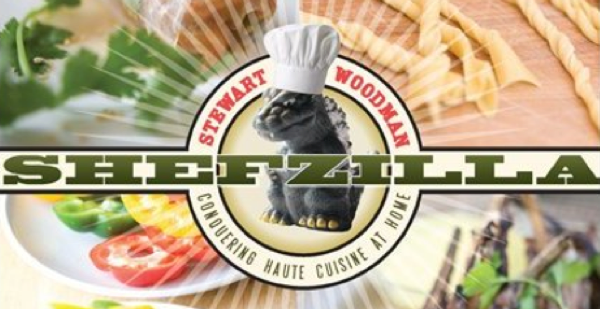I knew three things about Steward Woodman before reading his recently-released book Shefzilla: Conquering Haute Cuisine At Home. First, he was head chef/owner of Heidi’s in south Minneapolis before a kitchen fire devoured their space this past February. Second: he’s an outspoken blogger who doesn’t shy away from arguments in the social media space, oftentimes serving as instigator. And third, he doesn’t like locavores very much.
Despite documenting my own ambivalence over the growing interest in local food, I always feel a little defensive when someone dismisses organic, ethical, or sustainably-produced food as a preference without warrant. Most recently, Woodman lambasted chef Lenny Russo, who has received very positive reviews for his menu at Heartland, a restaurant in St. Paul featuring seasonal ingredients from local, small-scale farmers. Woodman thinks a commitment to local farmers shouldn’t influence how a chef is rated or viewed, any more than the chef’s skin color or sexual orientation would. Locavore bias annoys -- if not downright offends -- him, and Woodman wants us know our priorities are misplaced. He’s the cold bucket of water to temper our fervor over heirloom tomatoes and grass-fed beef.
 As I began reading Woodman’s anecdotes, interspersed among the 100+ recipes that make up Shefzilla, his perspective began to seem less antagonistic. What emerges are the words of a man who loves food; who feels a connection with and passion for ingredients with an intensity many don’t even feel for dear friends. We shouldn’t judge a person based on what country or religious tradition they come from, so is it fair to judge a carrot by how closely it was grown to our kitchen?
As I began reading Woodman’s anecdotes, interspersed among the 100+ recipes that make up Shefzilla, his perspective began to seem less antagonistic. What emerges are the words of a man who loves food; who feels a connection with and passion for ingredients with an intensity many don’t even feel for dear friends. We shouldn’t judge a person based on what country or religious tradition they come from, so is it fair to judge a carrot by how closely it was grown to our kitchen?
Ingredients take on a life of their own in Shefzilla, and become characters onto themselves. Woodman explains the unlikely love affair between turmeric and goat as if he were describing Romeo and Juliet. He speaks of the “extraordinary dividends” that come from listening to a beet, allowing them to “slowly yield their mysteries.” For as poetically as locavores like Michael Pollan can speak of a $6 peaches, Woodman brings ingredient adoration to a new level. It becomes easier to see how to him, a “local” label (or lack thereof) interferes with an ingredient’s ability to shine on its own merits.
While the stories in Shefzilla are something food lovers of all levels can relate to, the recipes themselves are for more experienced home chefs and foodies. If you don’t know what Grana Padano or Sriracha is, you’re going to have to google it: Woodman doesn’t lay it out for you. (an Italian cheese and Thai hot sauce, respectively). It’s understood that you have a moderate level of culinary techniques under your belt, as well as the experience to judge how much cook time certain steps require. Woodman developed the recipes after his restaurant burned and he suddenly found himself at home with an entirely different audience and set of tools to cook with. He adapted his style to these new environs, but didn’t forget his years of culinary training in the process. Some dishes are pretty straightforward, but this isn’t Rachel Ray’s 30-Minute Meals.
The tone of the book is infectious. It’s always a pleasure to bear witness to passion, and Woodman has loads of it. He mostly comes off as grateful and even humble-- not as cavalier as his blog lets on. (Though it does take some guts to brag in print that your carrot cake recipe is better than your mother-in-law’s). The “Essentials” section towards the end is a helpful guide to making sauces, spices, and stocks, and perhaps worth the price of the book on its own.
It should also be mentioned that Kate N.G. Sommers’ accompanying photographs are food porn of the highest order. I’ve been a fan of Sommers’ photo blog and work for The Heavy Table since early this year, and her depictions of Woodman’s craftsmanship do not disappoint. Jim Davis’ layout is equally satisfying, making for both a comfortable reading and cooking experience. These components form a package that will surely land Shefzilla on my local food lovers holiday gift guide this year, despite what Woodman might say about such a guide even existing.

Leslie Kruempel likes bringing people together to talk about real food, whether it's through the Real Food Minnesota gathering, Twin Cities Crop Mob, or on Twitter. Follow her at @realfoodmn.




